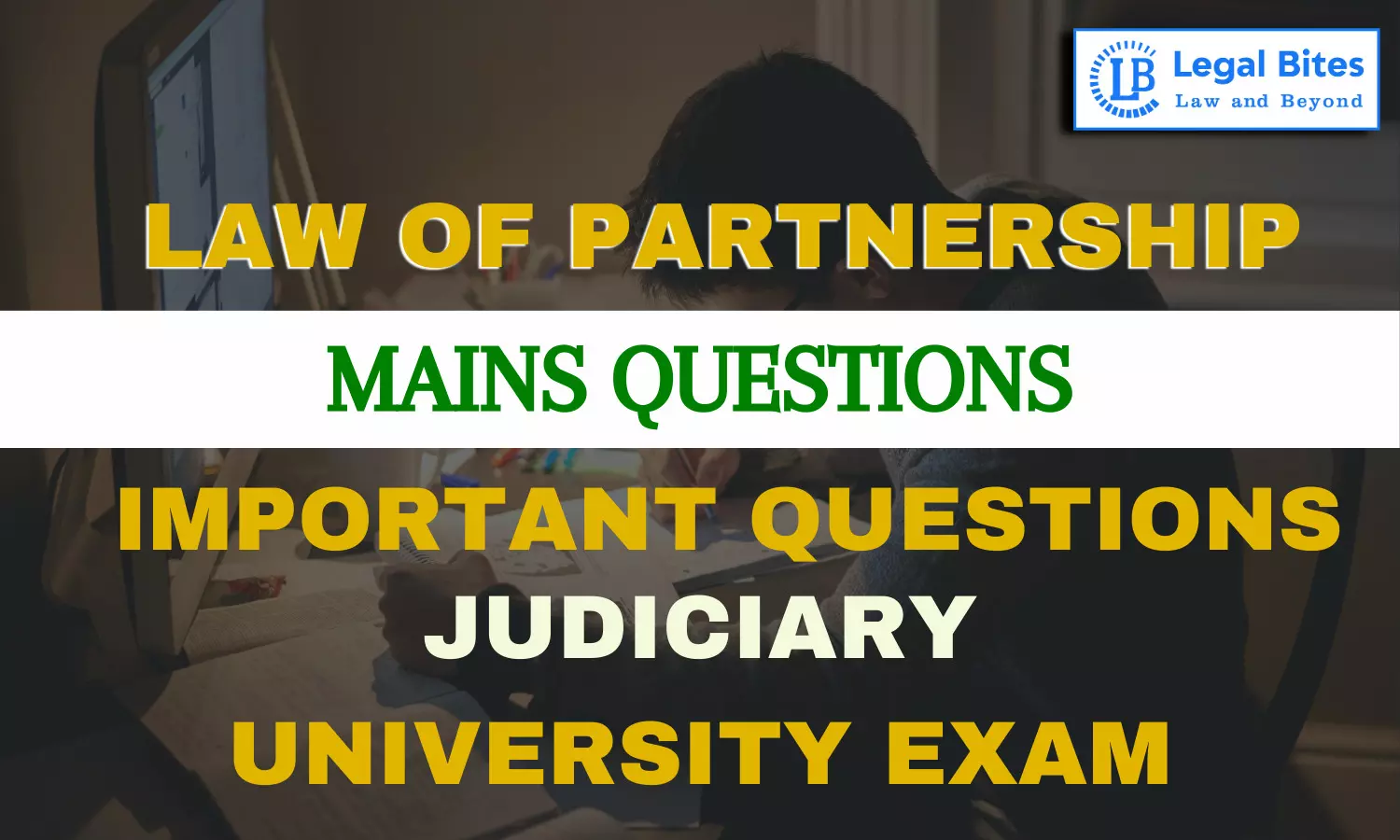A Partnership firm was financially embarrassed and therefore made a compromise with their creditors ‘B’, ‘C’, ‘D’ and ‘E’. Under the compromise, the property of firm was assigned to all the four creditors. They were empowered to carry on business, to share the profits among themselves.... Determine the existence of partnership.....
Find the answer to the mains question of the Law of Partnership only on Legal Bites.

Question: A partnership firm was financially embarrassed and therefore made a compromise with their creditors ‘B’, ‘C’, ‘D’ and ‘E’. Under the compromise, the property of firm was assigned to all the four creditors. They were empowered to carry on business, to share the profits among themselves, till the debts have been discharged. Determine the existence of partnership in the above situation and give reason in support of your answer.Find the answer to the mains question...
Question: A partnership firm was financially embarrassed and therefore made a compromise with their creditors ‘B’, ‘C’, ‘D’ and ‘E’. Under the compromise, the property of firm was assigned to all the four creditors. They were empowered to carry on business, to share the profits among themselves, till the debts have been discharged. Determine the existence of partnership in the above situation and give reason in support of your answer.
Find the answer to the mains question of the Law of Partnership only on Legal Bites. [A partnership firm was financially embarrassed and therefore made a compromise with their creditors ‘B’, ‘C’, ‘D’ and ‘E’. Under the compromise, the property of firm was assigned to all the four creditors. They were empowered to carry on business, to share the profits among themselves, till the debts have been discharged. Determine the existence of partnership in the above situation and give reason in support of your answer.]
Answer
In the situation described, it appears that a partnership firm made a compromise with its creditors (B, C, D, and E) due to financial difficulties. Under the compromise, the firm's property was assigned to the creditors, who were empowered to carry on the business and share the profits until the debts were discharged. Based on these facts, we need to determine the existence of a partnership in this situation.
According to Section 4 in The Indian Partnership Act, 1932 “Partnership” is the relation between persons who have agreed to share the profits of a business carried on by all or any of them acting for all. Persons who have entered into a partnership with one another are called individually “partners” and collectively a “firm”, and the name under which their business is carried on is called the “firm name”.
In order for a partnership to exist, certain essential elements must be present. These elements typically include an agreement between two or more persons to carry on a business, a common goal of making a profit, and a mutual contribution of capital, labour, or skill.
In the given situation, the partnership firm is facing financial distress and enters into a compromise with its creditors. However, the nature of this arrangement appears to be more aligned with a compromise or an arrangement for the repayment of debts rather than the formation of a partnership.
Here are some reasons to support the conclusion that a partnership does not exist in this situation:
a) Absence of a mutual agreement: The formation of a partnership requires a mutual agreement between the partners to carry on a business together. In this case, the arrangement seems to be primarily aimed at settling the debts of the partnership rather than continuing the business as partners.
b) Lack of a common goal: Partnerships are typically formed with the common goal of making a profit. In this situation, the primary objective appears to be the repayment of debts rather than the pursuit of profits through the operation of a business.
c) Absence of mutual contribution: Partnerships involve the mutual contribution of capital, labour, or skill by the partners. In the given scenario, the creditors are not contributing capital, labour, or skill to the business. Instead, they are assigned the property of the firm to secure the repayment of their debts.
Based on these reasons, it is unlikely that a partnership exists in the described situation. Instead, the arrangement seems to be a compromise or an arrangement made to facilitate the repayment of the firm's debts. It is essential to consider the specific terms of the compromise agreement and consult relevant partnership laws or legal advice for a comprehensive analysis and accurate determination of the legal status of the arrangement.

Mayank Shekhar
Mayank is an alumnus of the prestigious Faculty of Law, Delhi University. Under his leadership, Legal Bites has been researching and developing resources through blogging, educational resources, competitions, and seminars.
